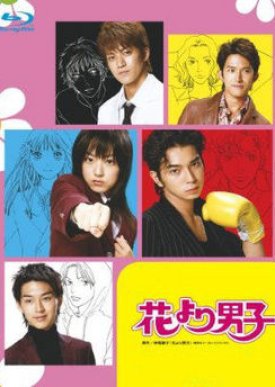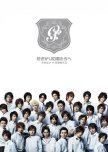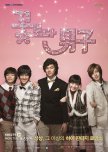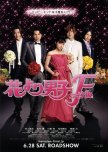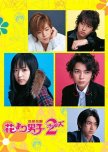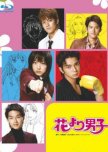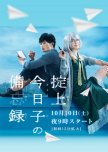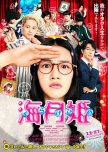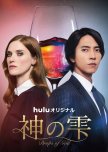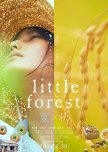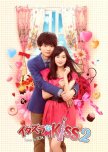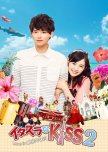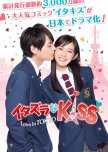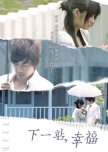
Esta resenha foi útil para você?

Reviewing In Retrospect; ‘ Hana Yori Dango’
Four years after the Taiwanese hit series ‘ Meteor Garden’, Japanese network TBS finally commissioned the rights for adapting their own series based upon mangaka Yoko Kamio’s ‘ Hana Yori Dango’.
Despite the critically-mixed 1995 Japanese movie sharing the same title, TBS’ ‘ Hana Yori Dango’ marked the first domestic and televised production adaptation of Kamio’s manga onscreen .
After the unimaginable success across Asia of ‘ Meteor Garden’, ‘ Hana Yori Dango’ was undeniably left in its predecessor’s shadow. Nevertheless whilst perhaps ‘ Hana Yori Dango’ did struggle to attain the same international success as the Taiwanese adaptation, the Japanese series was well-received domestically as well as amongst small circles of international drama enthusiasts at the time.
The series marked the breakthrough roles and the array of talents from several young and familiar faces in the Japanese acting industry ( especially Inoue Mao, Matsumoto Jun and Oguri Shun), as well as gain successful popularity through a sequel season and a movie adaptation also. However despite the drama’s praiseworthy reception for being one of the most “ underrated” adaptations, ‘ Hana Yori Dango’ cannot escape from its flaws either.
Similar to its predecessor( ‘ Meteor Garden’) and its source material, TBS’ ‘ Hana Yori Dango’ reimburses the “ Modern Cinderella” tale with “ mundane” main female lead Tsukushi Makino ( Inoue Mao). Makino is an ordinary middle-class girl who attends the elitist and and private Eitoku Gakuen through an acclaimed scholarship. However despite the prestige for attending the school, Makino is regularly sickened by the materialistic beliefs and principles of her wealthy classmates. Determined, Makino pledges that she’ll keep her head down until graduation.
However despite her obstinate decision, Makino’s plans are soon scuppered when she ends up befriending Sanjo Sakurako ( Sato Megumi). Sakurako ends up on the wrong side of the notorious Tsukasa Domyouji ( Matsumoto Jun). The conglomerate heir of one of Japan’s richest families and the ring leader of the school’s notorious clique, the F4, Tsukasa is renowned for his merciless bullying tactics . In particular, Tsukasa is associated with sending his signature “ red card”; the recipient being instantly labelled as a social pariah by the rest of the school.
Unable to sit back and watch her new friend suffer, Makino declares war on the leader of the F4. Nevertheless despite Tsukasa’s red card and bullying schemes , Makino finds comfort and determination to carry on through her crush on mysterious and suave F4 member, Hanazawa Rui ( Oguri Shun).
Meanwhile Tsukasa’s growing contempt and fascination for the female lead soon provides to complicate matters further, as Domyouji Tsukasa finds himself falling in love with Makino Tsukishi. As Makino finds herself torn between her complicated feelings, Tsukasa’s estranged and fierce mother Domyouji Kaede ( Kaga Mariko) proves only to complicate matters further…
Adapted to the small screen by a small screen of different directors ( Katayama Osamu, Ishii Yasuharu and Yamamuro Daisuke) and screenwriters ( Takuma Takayuki, Fujimoto Yuki, Takahashi Natsuko and Arai Shuuko), ‘ Hana Yori Dango’ has often been cited by aficionados of the franchise as one of the most “ faithful” adaptations to date. ( Although the series does notably adapt and tweak certain events from the manga in order to expedite storyline.)
The series is notably lighthearted and niche in parts. The comical elements of the series rely heavily upon sociocultural and sociolinguistic jokes which whilst offering certain comical relief , can be harder to grasp for audience members unfamiliar with Japanese culture.( One of the most notable gags in the series found through the original manga joke surrounding Tsukasa’s malapropisms, the “lessons” taught by Makino’s father [ Kobayashi Susumu] to her younger brother Makino Susumu [ Tomiura Satoshi] , as well as Tsukishi’s boss and dumpling store owner Sengoku Sachiyo[ Kato Takako]’s “eventful” past with famous celebrities.)
Nevertheless despite some over-the-top jokes within ‘ Hana Yori Dango’, the narrative could surprisingly take a wistful edge at times also. Domyouji’s estranged relationship with his mother is brief yet subtly tumultuous for audiences, whilst the throbbing teen-angst surrounding Makino’s feelings and Hanazawa Rui’s unrequited love for his sister-figure Todo Shizuka ( Sada Mayumi), is given a bittersweet presence within the events of the narrative.
On the other hand it’s undeniable that ‘ Hana Yori Dango’ isn’t a storyline inescapable from predictable and shoehorned tropes. The events surrounding the female lead’s “ dilemmas” as well as the archetypes of “ niche bullies” or “ twists” often led to predictable outcomes. As a consequence, it was apparent that ‘ Hana Yori Dango’’s heavy reliance upon themes surrounding bullying, assault and blackmail were
quintessential for the events of the storyline, but were given a ham-fisted approach by the writers.
Despite Mao Inoue debuting as an actress around the age of five, ‘ Hana Yori Dango’ is still considered one of Inoue’s breakout roles playing main female lead Tsukishi Makino. The young actress’ performance is admittedly slightly exaggerated in parts with certain line deliverances and comical dialogue exchanges often falling flat at certain times . Nevertheless, Inoue Mao was able to carry on through her performances during some of the drama’s more sincere and heartfelt moments with a dynamic charm.
As a character, Tsukishi Makino is notably headstrong, resilient as well as kindhearted. Whilst it is important to respect that other incarnations of the character are variable and independent from one another, it is notable that Makino’s inability to bend so easily at first to the will of Domyouji Tsukasa gave her a slightly more tactful and resilient edge at times than other versions. On the other hand similar to numerous counterparts, Makino could often feel as though she was somewhat dulled by her greater character drives and goals outside of her “ potential” love interests.
Costarring alongside Mao was Matsumoto Jun. A member of the famous ARASHI boyband, Matsumoto Jun’s performance as Domyouji Tsukasa was admittedly heartfelt as well as somewhat dull in parts. Jun’s comical or lighthearted exchanges could sometimes lack finesse. On the other hand Jun’s prior acting experience in dramas such as ‘ Gokusen’ seemed to come to good use during heart-wrenching moments of the series, by adding an angst-ridden charm to his onscreen persona also.
Domyouji Tsukasa is an interpretative character for screenwriters and directors alike. However Tsukasa’s character archetype has notably fallen into two categories throughout past adaptations; fractious, jovial and angsty, or satirical, brooding and unpredictable. As it happens Jun’s Domyouji Tsukasa notably fell into the latter category for most of the series. ( Similar to his manga counterpart.)Tsukasa did notably have his “ darker” character moments, but the screenplay was heavily focused upon presenting a more lighthearted as well as a “ complicated” familial scenario for Tsukasa. However similar to his manga counterpart and other adaptations, Tsukasa’s greatest character flaw could often be found through his inability to truly repent or be remorseful over his actions or treatment of others; offering limited character development at times for the male lead.
Then of course there’s Oguri Shun as second male lead Hanazawa Rui. Similar to his costar Mao Inoue, Shun’s acting career began during his childhood. On the other hand prior to his role in ‘ Hana Yori Dango’, Shun notably took on the roles of “unusual” characters such as his parts in ‘ Great Teacher Onizuka’, ‘ Summer Snow’ and ‘ Gokusen’.
Whilst playing the role as suave and mysterious Hanazawa Rui was certainly not a stretch for Shun, it seemed an unusual casting choice and decision for the actor to take on a “romantic potential love interest” role which could’ve easily been one-dimensional. Although Shun’s performance is somewhat limited in parts by dialogue and interactions, the acting surprisingly gave the second male-lead a charismatic and beguiling charm for audiences.
Hanazawa Rui’s onscreen counterparts have always differed. Whilst certain adaptations have depicted Rui as sweet, easygoing and somewhat flatline second male lead, others have stayed more faithful to the original manga by depicting Rui’s mysterious, cool-headed and taciturn personality. Naturally the Japanese version of Hanazawa Rui does make some nuanced changes towards Rui as a character in comparison to his predecessor and manga counterpart. On the other hand whilst Rui had his own character drive and a battle of ambivalent feelings, the second male lead could feel somewhat shoehorned into the plot through various scenarios as the narrative professed.
The chemistry between our main leads is admittedly variable. Whilst there are heart-wrenching and lighthearted moments where the onscreen chemistry between Shun, Inoue and Matsumoto could feel natural and concise, there were other moments in the series where this could feel limited and slightly stunted by plot.
Aside from the main cast, there is also Mimasaka Akira ( Abe Tsuyoshi) and Nishikado Sojiro ( Matsuda Shota), fellow F4 members, who whilst gradually developing an unlikely friendship with Makino and necessary at times for major plot dilemmas , could often feel somewhat staid and shoehorned into scenarios. Similar to the flawed position of Sojiro and Akira, there is also Makino’s best friend Matsuoka Yuki ( Nishihara Aki) and Tsukasa’s older sister, Domyouji Tsubaki ( Matsushima Nanako); supportive and kindhearted characters , but rarely having sentient character-drive also.
Hana Yori Dango’s narrative notably follows the first major arc of the manga with a fair degree of accuracy . ( Although notably certain minor events and characters are left out or tweaked.) The storyline is notably fast-paced during initial events and is mainly pacy in parts. Nevertheless by the halfway mark, the narrative notably slows down in order to focus on a dragged-out plot dilemma as well as the gradual events leading up to the finale. Whilst this wasn’t entirely a bad writing decision per say and did allow opportunities in order to focus on sentimental elements of the storyline, it could often create a slightly grating experience in parts for viewers by the second-half.
Under the directing reigns of the trio,’ Hana Yori Dango’ is notably an eclectic array of slick editing and shots as well as somewhat amateurish and sloppy editing techniques. Of course whilst it is important to review this in retrospect, ‘ Hana Yori Dango’ could still feel dated at times with its filming even for a 2000s drama. Nevertheless it is notable that despite some dated technology for modern viewers, ‘ Hana Yori Dango’ is one of the few adaptations in the series which helped to captivate the authentic wealthiness of its characters through flashing well-known haute couture fashion brands onscreen. ( TBS’ sponsorship deals certainty paid off well .)
The OST is also very memorable, especially the array of instrumentals- mostly variations of the same theme. Whilst some of these tracks could often blend into one another, one of the most striking tracks during heartfelt moments of the drama came through a euphonious version of the theme, ‘ Blue Mind’; climatic, heartwarming and surprisingly subtle.
Overall ‘ Hana Yori Dango’ offered viewers with a luxurious and fairly faithful adaptation of Kamio’s beloved franchise. Whilst modern viewers may struggle to relate towards the somewhat insipid presentation of themes, shoehorned tropes and dated technology, ‘ Hana Yori Dango’ does offer viewers with a somewhat simplistic and bubbly charm. The acting is decent enough and whilst there are some inconsistencies at times, the onscreen chemistry between Matsumoto and Inoue is surprisingly sweet and engaging. The ending of the series offered viewers with a cliffhanger. Whilst this did allow the drama to setup events for the sequel season, it did admittedly leave the finale of ‘ Hana Yori Dango’ slightly rushed in parts. Nevertheless ‘ Hana Yori Dango’ was a surprisingly decent adaptation with a surprisingly engaging charm and appeal for audiences.
Esta resenha foi útil para você?

I never watched Garo again, tokusatso was never my thing. But Hana Yori Dango helped make the person I am today and it is saying a lot.
Let me tell you about Makino and her never ending fight for what she thinks is right and for the ones who are unfortunate. Captivates you in a way that few can and makes you see yourself in her place and smile with her, cry with her, hate and love with her and after 10 years still say “arienayitsuno!!” for anything that is unbelievable.
Let me tell you about Hanazawa Rui who will be your teenager dream ideal guy and make you forever see yourself as a second lead syndrome girl, even if it is in general very difficult for you to prefer second lead guys in the future (it just happened one time more in those 10 years). Who you will decide is your favorite actor and after that you will follow his career very fondly and many others of his work will became your favorite.
Let me tell about Domyoji who in Makino’s words is “stupid, selfish, self-centred” and have bad hair, and is the only main lead that in the same time is the comic relief in a drama. Can make you love and hate him as much as Makino loves and hate him. Who is a complex character that should be an example for every personage which is a bad guy turned good in storytelling. Those three together compose the best triangle love story that ever was made.
Hana Your Dango is above all a story about friendship, the relation between the F4 and how the support each other thought life is something memorable. In the first glimpse you think they are just a bunch of spoiled rick guys but each and every one of them are so much more. The complexity of Hana Yori Dango characters is what makes this amazing. And let’s agree that the F4 was the Bromance before bromance was a thing.
I think I can say that Hana Yori Dango Format was one of the best things Asia ever made. And is in the recommendation list of every drama fan in the world. Choose your poison it is Hana Yori Dango, Boys over Flower or Meteor Garden, I’ve chosen mine. I never watched the other versions, this is the one drama I can not compare, will never compare with anything, but by the popularity of the other versions is saying something it do not disappointed.
So go for it, enter the room and change your life forever. This is worth.
Esta resenha foi útil para você?

Meteor Garden was the first Asian drama i have totally followed and watched and have loved the cast/actors. And at first, I was really hesitant to watch this drama back then when it was shown in my country. Since i was curious how it will be compared to MG, I said I will give a try at the first episode. But after the first episode, dang! I was really blown! I loved it already! it was interesting up to last episode.
They may not as good looking at first compared to MG actors and BoF but the cast have their charms to lure you to continue to watch. And every actor is like tailor-fit for the characters in the story. Each character convinces you or actually never made you think they were just acting out each scene.
I am really convinced the characters were meant for them.
Inoue Mao is by far the best for Makino role and Jun Matsumoto for Domiyouji role. They have the best chemistry compared to other versions. No wonder up until now rumours about them still come up from time to time. The other F4 members too, I believe had it been other actors to be put in that role, the story and it's charm will be different.
This is the best Asian drama for me now. And will always be in my heart. I have lost count already how many times I have watched this drama and the 2nd second season as well as the movie. And I am still for sure, going to watch it again when I feel like to.
I will always recommend it to first-timers to Asian or Japanese dramas.
Esta resenha foi útil para você?

The characters are brought to life perfectly by the actors and everyone performed their roles outstandingly, especially Matsumoto Jun and Oguri Shun who are staples in modern Japanese dramas. The characters all felt so human with human flaws which made them very easy to relate to.
Although I have never read the manga, the story of the drama was well written and had me in tears at various points across the story. This was also helped immensely by the song 'planetarium' by Otsuka Ai which beautifully accompanied the story.
Overall I would recommend this drama to anyone who is considering watching it. It is funny, touching and romantic all at the same time and I consider it a must watch drama.
Esta resenha foi útil para você?

On another note I would gladly recommend this version versus the remakes because this one stays true to the original. So if you like a Funny, Romantic, Adventure story this is the one to see till the end.
Esta resenha foi útil para você?

Esta resenha pode conter spoilers
THE BEST ADAPTATION OF A MANGA
Let me just say this: Be it the blindness caused by nostalgia, be it my appreciation for Matsumoto Jun and Inoue Mao as actors or something else... If this isn`t your favorite, or at least your second favorite adaptation of this material, then I cannot trust your judgement. It might seem harsh to a bystander, so let me elaborate on my strong opinion.This version of the well-known shoujo manga classic "Hana Yori Dango"(or Boys Over Flowers) should`ve just been a way to cash in on the popularity of its material, which is probably why they only made 9 episodes at first. Even the cast seems picked at random to a careless overseer. What I`m sure both the producers, as well as directors didn`t expect, is that they`ll end up creating one of, if not the most influential manga adaptation of all time. That is, for a lack of a better word, Hana Yori Dango has become the golden standard for me, of how a rather vapid and clichéd material should be improved upon and handled.
Let me make something very clear: Hana Yori Dango, the drama adaptation, is significantly better than both the manga and the anime. Yes, I`m perfectly aware that what I`m saying is almost unheard of, but that doesn`t make it any less true. Is the story clichéd and at times, nonsensical?Sure, it is based off of a shoujo dramatic manga, after all. However, it is miles better than its source material and the reason for that is both the IMMACULATE cast, their chemistry AND most importantly, what the director chose to shoot and present to the audience as such. The fact that most important characters are shaped by this, and thus different than their later counterparts, coupled with the way they are acted, makes this a show that improves upon the manga and the anime indefinitely.
Now for the cast that I keep praising to high heavens. Another fact that you should know: Each actor embodies his character PERFECTLY. As in the characters become the actors themselves. Many praise the Korean version of this, AKA Boys Over Flowers, and especially Lee Min-ho`s portrayal of the despotic, ruthless and chaotic Gu Jun-Pyo(Doumyouji Tsukasa) but after being treated to the layered portrayal done by Matsumoto Jun, (who`s just about one of the most talented people I`ve ever seen working in Japanese entertainment industry today), any other will seem one note or even unsatisfactory. Same goes for Inoue Mao, Oguri Shun etc. You would think that in 9 episodes, the timing would be off and the episodes would be rushed but that also, couldn`t be further than the truth. Everything flows remarkably well with no boring parts in between. To put it really simply, I think that this version, at first, was supposed to be done just for financial benefit and that`s it. But, along the way, the actors, the writers, the directors, chose to instead offer something bursting with effort, feelings and talent. At first glance, physically, none of the actors other than Mao Inoue, fit the characters that they are playing. Matsumoto Jun is not tall, buff or aggressive-looking. Oguri Shun is not extremely delicate, pale nor that elegant. But due to their talent, the characters that were supposed to embody the actors, ended up being embodied by the actors instead. There`s a reason why, to this day there is talk about Mao and Jun still being together. It`s the overwhelming chemistry that`s to blame.
As for the cons of this classic, I would say that they either harken back to the original material(love triangles, misunderstandings) or the acting of one villain in particular, which seemed overwhelmingly cheesy, so I have to be objective on that. However!If you`re unsure of which adaptation of this manga you should watch, I warmly suggest this one, because it excels in every way and will stand any test of time.
Esta resenha foi útil para você?

-STORY (10/10) :- the reason i liked the story the most in this drama that it came with a cliche idea of love between rich and poor but presented it with a very unique and breath taking way that was never done it took it to another level completely , also the pacing of the story was well done things weren't rushed or boring at all it had perfect pacing that wouldn't make you feel tired and would make you want more
-CAST (8/10) :- the reason i gave the cast an 8 was that not all of them are as good looking as you think and honestly some were unnoticed but that isn't a problem the main actress did her part well so i guess it depends on your taste .
-Music (9/10) :- well this is not a musical drama but music is ended a major factor of making the correct atmosphere , the music in hana yori dango was good it was not that breath taking but the music they played fit well with scenes no problems in the impact .
Well overall its one of my favorite Jdrama ever because it reaches a deep place in your heart when you watch it you will never forget about it , and i would re-watch again it only when i am hurt because it gives people hope and a fact that nothing is impossible in life and sometimes the unexpected happens!
hope i was of good help :)
Esta resenha foi útil para você?

Story - At its most basic form, its a run of the mill, rich boy falls in love with poor girl, which is typical. Although it is a common story, I like that the air time used was short and to the point. It was also done well enough to convey emotions and storyline within the allowed time (not counting the second season and movie of course).
Acting/Cast - What can I say? Inoue Mao is a great female lead, with the male leads being large names themselves. A star-studded cast, who portray great synergy amongst them and can really be seen within the lighter parts of the drama.
Music - I don't really remember much of the OST's for this drama, so I'll leave this one blank.
Rewatch - Definitely. As stated before, the length of the drama is short enough that it doesn't take chunks of your day watching a few episodes.
Overall - Great drama. Definitely recommended for those who are iffy about Jdramas.
Esta resenha foi útil para você?
This drama is only 9 episodes long, but it took me weeks to finish because of its plodding, contrived plot and character 180s.
For a story centered around character growth, especially for the male lead, he undergoes very little actual growth and has even fewer redeeming qualities. His "sympathetic" backstory does little to excuse his controlling, arrogant, and childish personality. He consistently behaves immaturely and violently - [tw] he even sends goonies out to rape the female lead when she calls him out for bullying. He is never confronted about these incidents and does not show any remorse for them. His feelings for her and his frankly pathetic behavior towards her in response are examples of what not to look for in a partner.
The female lead, Makino, herself is a solid character, and none of the other F4 are as bad as their leader. But they are not enough to save this train wreck of a drama.
Esta resenha foi útil para você?

Hana Yori Dango is a timeless story with all of the classic cliches. While the story is slightly unbelievable, and can be frustrating at times, I still love it. I actually liked the story line in Hana Yori Dango better than that of Boys Over Flowers. I liked the fact that they spent less time on the love triangle between Tsukushi, Domyouji, and Rui and focused on other things. It got a little tedious in Boys Over Flowers and I was very pleased to see that Hana Yori Dango handled it differently. Basically I really liked the story, though it was, for the most part, predictable (simply because I already know the plot), the pacing was nice, and I liked the vibe.
I loved the acting. As much as I love Lee Min Ho as Jun Pyo, I completely fell for Matsumoto Jun as Domyouji. His character felt a little more appealing in Hana Yori Dango. MatsuJun can pull of spoiled-rich-boy like no other and I loved seeing his internal conflict and development. He was such an angry, funny, and occasionally charming character. I also really liked Oguri Shun's portrayal of Rui! Kim Hyun Joong's performance as Ji Hoo can't quite compare. Oguri Shun made the character more likable. Though Sojiro and Akira were both more minor characters I liked them as well. I felt more of a connection to them in Hana Yori Dango than in Boys Over Flowers. Overall, I felt as if the cast really pulled off the whole high-schooler vibe, which is sometimes hard to do in dramas.
As for Makino, Inoue Mao was fabulous. She was pretty without being too pretty, smart without being a genius, and awkward without being to awkward. Basically she was a nice balanced character. I remember getting a lot of 2nd hand embarrassment while watching Gu Hye Seon as Jan Di in Boys Over Flowers. This wasn't so much the case in Hana Yori Dango. There were certainly embarrassing moments, but I wasn't constantly cringing. Basically I think I really prefer Inoue Mao over Gu Hye Seon. I just liked her in the role so much more.
The music was really catchy, but not overplayed. I loved Arashi's contributions to the soundtrack as well as the other songs. The OST fit the drama really well.
When it comes to comparing Hana Yori Dango and Boys Over Flowers, I can't really do it. Hana Yori Dango is probably the better drama, and I think I like it more than BOF, but they're both their own pieces of work with their own styles. BOF was my first drama ever, so I owe a lot to it. It will always have a special place in my heart. But I adored Hana Yori Dango. It had such a different feeling to it and I loved it. But honestly, I love both dramas in their own ways.
Overall, I immensely enjoyed Hana Yori Dango and will be starting season two immediately. The finale of season one was definitely satisfying, but a perfect set up for a second season. I can't wait to see what it brings!
Esta resenha foi útil para você?
DIdn't care for it
I found the characters to be unlikeable, the actors weren't very attractive, I found the acting to be WAY over the top, there was no chemistry, and where the Korean BOF was too long, this one was too short, in that I didn't think it was developed that well. This was one that I watched and forgot to review, a couple of years went by, and I watched it again, it was that forgettable. It has not aged well either.As in BOF, I could NEVER understand why the FL fell in love with the ML. That was just a toxic relationship all the way around.
Esta resenha foi útil para você?

